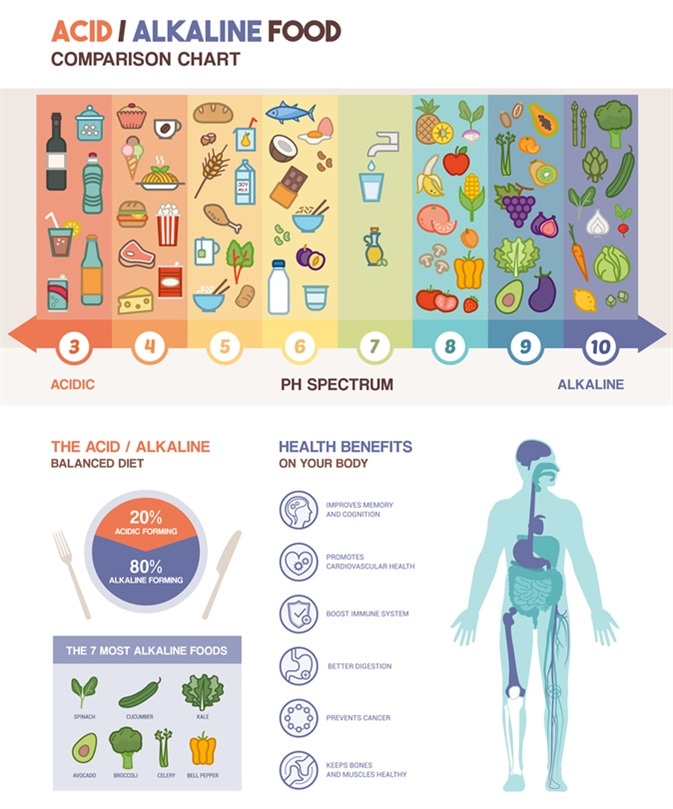
Also called the acid-alkaline diet or the alkaline ash diet, this eating plan is based on the consumption of alkaline-forming foods in place of acid-forming foods.
Proponents of the diet argue that this can improve health and extend lifespan, since eating acid-producing foods such as red meat gives rise to a pH imbalance that sets us up for poor health.
The idea is that a person can control the acidity or alkalinity of their body through the foods they consume. When food is metabolised to extract calories, the food is burnt, leaving an ash residue that may be acidic, alkaline or neutral. Advocates of the alkaline diet claim that this ash can affect how acidic the body is and that acidic ash increases susceptibility to disease. Alkaline ash, on the other hand, they believe is protective and that by “alkalizing” the diet and balancing the body’s pH, it is possible to improve health.
The food eaten includes vegetables, fruits, almonds, lentils, soy products, tofu and sprouted grains. Approximately 80% of foods should be alkalizing foods and 20% can be acid forming; a rule that is applied to every meal and drink.

Examples of acid-forming foods (pH0 to 7)are meats, poultry, eggs, dairy products, sugary drinks, snacks, wheat products, coffee, mayonnaise, milk, alcohol and ketchup; examples of neutral foods (ph7) are natural fats, sugars and starches and examples of alkaline foods (pH 7 to 14) are vegetables, legumes, fruits and nuts.
Some of the advantages and disadvantages of following this diet are described below.
Advantages
- The diet is heavy on fruit, vegetables and grains and cuts back on red meat, added sugar and processed and junk foods.
- Some people find they have more energy, experience fewer gut problems and lose weight. However, this could be a result of cutting back on processed and junk foods rather than being linked to reduced acidity.
- Unlike some other diets, the alkaline diet does not eliminate entire food groups. People can still consume acid-forming foods; they simply eat less of them.
- The diet is not expensive to maintain.
Negatives
- The claims about how this diet works have not been supported by any reliable scientific evidence.
- Acids such as DNA, fatty acids and amino acids are essential building blocks to life.
- Proponents of this diet advise limiting meat, dairy and eggs, all of which are beneficial to health and contain important proteins and nutrients.
- The human body strictly regulates its own pH, which is one of the main roles of the kidneys. Many experts therefore do not believe it can be altered by diet.
Sources
- US News and World Report, Acid Alkaline Diet, http://health.usnews.com/best-diet/acid-alkaline-diet
- Authority Nutrition, The Alkaline Diet: An Evidence-Based Review, https://authoritynutrition.com/the-alkaline-diet-myth/
- Should You Make Yourself More Alkaline? nymag.com/thecut/swellness/2016/08/alkaline-diet-pros-and-cons.html
Further Reading
- All Alkaline Diet Content
Last Updated: Feb 26, 2019

Written by
Sally Robertson
Sally has a Bachelor's Degree in Biomedical Sciences (B.Sc.). She is a specialist in reviewing and summarising the latest findings across all areas of medicine covered in major, high-impact, world-leading international medical journals, international press conferences and bulletins from governmental agencies and regulatory bodies. At News-Medical, Sally generates daily news features, life science articles and interview coverage.
Source: Read Full Article